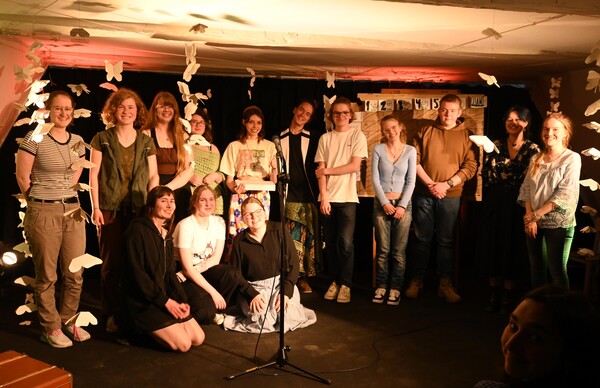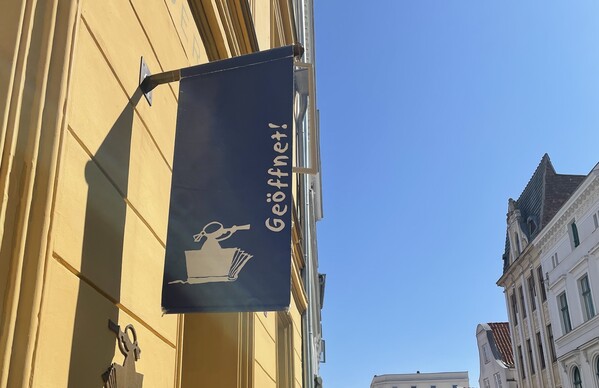An hour drive from Hamburg and in short distance from the Baltic Sea, the German city of Lübeck is located, primarily known for its delicious marzipan and picturesque historical city center. While strolling through the old town, one might notice a grand, characteristic North German merchant’s house, now home to the children’s literature house “Bücherpiraten” (book pirates).
The non-profit Association was founded over twenty years ago and offers a wide range of programs and events for children and teenagers. Even though books and reading often play a central role, Bücherpiraten don’t fixate on the act of book reading. Rather, the overarching idea is to have stories – in whatever shape or form – act as a safe, welcoming space, which allows participants to actively explore, create, teamwork, present, and become self-confident in their abilities and decisions: May that be through reading, writing, composing, acting, organizing, filming, listening, poetry slamming… you name it. To break away from a rigid, institutionalized and canon-based book reading approach, it was important to sharpen the awareness for practices and understandings of literature and reading promotion outside of Germany, founder and managing director Leandra Sanders explains.
Books for everyone
Over ten thousand people visit the Bücherpiraten-house every year, many of them being day care or school groups in search of a new read in the Benefiz-Buchladen (charity bookstore). Following the motto “every child needs books”, the Association sends out 1000 book-vouchers every year to children whose families depend on social welfare and therefore usually don’t have the means to buy reading material. Sanders states that the charity bookstore, which depends on gifts by publishing houses and private book donors, often times is the first opportunity for those kids to get in contact with books.
For children whose mother tongue isn’t German, books in German can be a tough challenge, especially in early reading (aloud) stages. To support this target group, the Bücherpiraten project 1001 Sprache offers numerous free bilingual picture books on their website, spanning seventy-seven languages. Every book, from the story to its illustrations, is created in collaboration between children and artists and subsequently translated by a network of over two hundred volunteers. This initiative was honored by a special mention in the 2023 BolognaRagazzo Crossmedia Awards.
Outside of attending one of the manyfold programs, the light-flooded, high ceilings house is also just a place to meet up with friends, gather around and do homework. Sanders observes that their house is not just a meeting point for bookworms, but also frequently visited by kids who although not avid readers, simply feel comfortable being surrounded by books.
From children and teenagers for children and teenagers
As mentioned, the Bücherpiraten are not just an address for literary readings (what one could guess is the prime focus of a literature house), but instead look to empower the young to get creative and work on their own projects. For example, die Blaue Seite (the blue page) is an online literary hub from and for teenagers. The editorial team consists of round about ten teenagers from Lübeck, who run the website and produce its content – literary reviews, interviews with creative people from the book industry as well as innovative podcasts on bookish topics.

The Bücherpiraten also host two annual children literature festivals in their literature house: The Bücherpiraten-Festival and the Jugendbuchtage (Youth Book Days). Both festivals span across multiple days and revolve around books, reading and stories from morning till evening. Children, teenagers, families and school groups can dive into new adventures by attending the various workshops and readings with authors, illustrators and actors. The Jugendbuchtage are 100% organized by teenagers between 14 and 19 – from coming up with an overarching theme and designing the accompanying artwork to contacting authors and making sure everything goes to plan during the festival days. The Bücherpiraten-Festival – which exists since the Association was founded – also provides the very young their own dedicated segment: Every year, a kids-jury (8-10 years) awards the Golden Bookpirate to who they have decided on to be the best newcomer author, without any interference or preselection by adults. The 1000€ award gets handed over to the author in a ceremony organized by the jury, including a laudation.
Pedestrians who walk the cobblestone streets of Lübeck and pay close attention to details, can also witness the works by the anonymous Bücherpiraten-poets outside of the old merchant’s house: Haikus on gully covers or bus emergency hammers, poems on door handles and thought-paperboats floating down the city river – lighting up the day to those who walk around bright-eyed.
Promoting reading to strengthen democracy
The political momentum supporting the importance of reading skills as a prerequisite of democracy, e.g., just recently underlined by WEXFO’s Kristenn Einarsson, has also become more notable when applying for projects, Sanders agrees. She elaborates, that luckily you can’t have one without the other, as through stories, young readers become aware of the different shapes their life could possibly take and in return sensible for the realities of other individuals. In 2023, the Bücherpiraten conducted interviews with former and active participants to evaluate the impact of their programs: Beyond the expected improvement in the areas of reading, writing, and language, it showed that the low threshold opportunities to become part of an active process of creating and organizing tangible results at an early life stage, lead to self-confident citizens strong in social skills and interested in participating in societal discourses.

The Bücherpiraten are not supported by continuous, structural state funding, but instead generate 50% of their income themselves and the other half through temporary project grants. Under these circumstances it’s very challenging to plan long-term, as project funding often looks to support new, innovative initiatives rather than pedagogically proven, successfully running programs. On the other hand, Sanders recognizes the benefits of being largely independent due to not being a financially tied, cultural and educational “service provider “to the city of Lübeck.
Therefore, as many other non-profit Associations, the Bücherpiraten heavily depend on their numerous volunteers, who e.g., run the bookstore or visit day care groups to share and read books, and far exceed the few employed staff members. Lenara Sanders gratefully reports, that many of the children and teenagers she saw grow up with the Bücherpiraten, have now become volunteers who help maintain this welcoming port for the next generation’s book pirates.
 By
By 

















